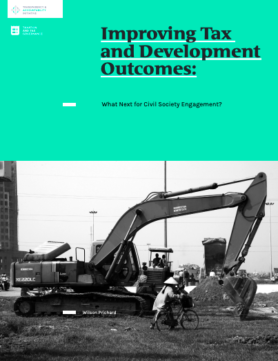Brief
Recent years have seen a dramatic surge in international attention to the importance of revenue raising in developing countries, spurred by:
(a) the need for revenues to fund investments critical to the achievement of the sustainable development goals,
(b) growing concern with increasing inequality, and
(c) the possibility that expanded taxation may offer a platform and opportunity for strengthening the fiscal contract between taxpayers and governments.
However, expanded attention to the potential importance of taxation has progressively been accompanied by growing awareness of the potential risks: existing tax systems in developing countries are frequently inequitable in their implementation and incidence, while taxpayers express significant skepticism that revenues are consistently translated into public benefits. Absent considerable oversight and accountability there are concerns that these problems may persist, with investments in strengthening tax systems reinforcing existing inequalities and allowing governments to expand extraction from taxpayers without delivering reciprocal benefits.
Put simply the promised benefits of investments in strengthening tax systems are likely to depend on the ability of taxpayers to generate pressure for fair and equitable taxation, and the consistent translation of tax revenues into public benefits. This realization has prompted a rapidly expanding focus on the crucial role of civil society in seeking to shape the tax reform agenda locally, nationally and internationally. These efforts will build on significant existing strengths, including global networks of civil society groups involved in monitoring budgeting processes, the extensive expertise and influence of civil society groups that have shaped international tax reform over the past decade, and more fragmented country-level experiences of engaging directly with tax issues. Yet expanded civil society influence also confronts significant challenges, including:
(a) limited existing expertise relative to expanded demand,
(b) the relative scarcity of existing national campaigns around revenue raising,
(c) the difficulty of building popular support for better taxation, as distinct from more common anti-tax advocacy, and
(d) a need to strengthen links between national and international advocacy focused on the tax concerns of developing countries.
This brief note seeks to offer preliminary thoughts on the way forward, focusing on three questions in turn. First, in high-level terms what might be appropriate focuses for civil society campaigning around taxation? Second, what, more concretely, do we know about how best to pursue those goals, and what are some of the likely challenges? Third, what types of capacity needs do this present, and how might they be addressed? In all areas, the ideas presented here reflect broad initial thoughts, supported by anecdotal and selective evidence, concerning engagement with tax issues specifically. Some key issues are almost certainly overlooked, while there is no effort made to comment on more general challenges of civil society organizing and engagement. The brief intends to act as a contribution to a broader and ongoing discussion.

